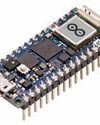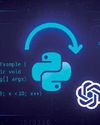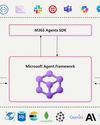Versuchen GOLD - Frei
Deploying Generative AI LLMs on Docker
Open Source For You
|November 2024
Built on massive datasets, large language models or LLMS are closely associated with generative Al. Integrating these models with Docker has quite a few advantages.

Generative AI, a growing and prominent segment of artificial intelligence, refers to systems capable of producing content autonomously, ranging from text, images and music, to even code. Unlike traditional AI systems, which are primarily deterministic and perform tasks based on explicit rules or supervised learning, generative AI models are designed to create new data that mirrors the characteristics of their training data. This capability has profound implications, transforming industries by automating creative processes, enhancing human creativity, and opening new avenues for innovation.
According to Fortune Business Insights, the global generative AI market was valued at approximately US$ 43.87 billion in 2023. This market is projected to increase from US$ 67.18 billion in 2024 to US$ 967.65 billion by 2032. This dominance can be attributed to several factors, including the presence of key technology companies, significant investments in AI research and development, and a robust ecosystem that fosters innovation and collaboration. As businesses across various sectors increasingly adopt generative AI solutions to enhance their operations, the market is poised for unprecedented growth and transformation in the coming years.
Large language models (LLMs) are closely associated with generative AI and specifically focused on text generation and comprehension. LLMs such as OpenAI’s GPT-4 and Google’s PaLM are built on massive datasets encompassing a wide range of human knowledge. These models are trained to understand and generate human language with a high degree of coherence and fluency, making them instrumental in applications ranging from conversational agents to automated content creation.
Diese Geschichte stammt aus der November 2024-Ausgabe von Open Source For You.
Abonnieren Sie Magzter GOLD, um auf Tausende kuratierter Premium-Geschichten und über 9.000 Zeitschriften und Zeitungen zuzugreifen.
Sie sind bereits Abonnent? Anmelden
WEITERE GESCHICHTEN VON Open Source For You

Open Source For You
The Role of Open Source in Building Modern Data Infrastructure
It's no secret that open source is emerging as the backbone of modern data infrastructure. Here’s a list of the core open source technologies used to deploy this infrastructure, along with some real-world examples and a brief on why open source matters.
3 mins
December 2025

Open Source For You
The Whispering Machines: How Open Source is Bringing Intelligence to the Tiniest Devices
Built on open source frameworks, TinyML is enabling complex machine learning models to run on the microcontrollers embedded in connected devices, bringing artificial intelligence to the very edge of the network.
3 mins
December 2025

Open Source For You
Setting Up Snort to Secure Your Network
Snort is a popular, open source intrusion detection system that monitors traffic in real time to detect malware. Here’s a detailed explanation of how to set it up on Ubuntu and test it by generating traffic from another system.
7 mins
December 2025

Open Source For You
When AI Meets DevOps to Build Self-Healing Systems
Traditional DevOps, with its rule-based automation, is struggling to work effectively in today’s complex tech world. But when combined with AlOps, it can lead to IT systems that predict failures and solve issues without human intervention.
7 mins
December 2025

Open Source For You
How to Automate Java Code Modernisation
This short guide illustrates that automating Java code modernisation with Python and OpenAI API is not just possible-it's remarkably effective.
5 mins
December 2025

Open Source For You
The Quest to Build a Quantum Computer
The road to large-scale quantum computing is long and hard, with incremental advances paving the way. But the destination is in sight.
12 mins
December 2025

Open Source For You
Job Opportunities: What's Hot in the Cloud Space?
If there's one field that refuses to slow down, it's cloud computing. Even as automation and AI reshape roles, cloud adoption continues to surge. From startups deploying microservices overnight to enterprises migrating decades of legacy systems, cloud remains the engine of digital transformation. For professionals, this means one thing: skills that live in the cloud won't come down anytime soon.
2 mins
December 2025

Open Source For You
Securing Client Identity with Post-Quantum Cryptography
Here's a quick tutorial on how to build a secure, real world client-server model that establishes client identity by using CRYSTALS-Dilithium, a post-quantum cryptography algorithm.
3 mins
December 2025

Open Source For You
Unlocking the Power of Multi-Agent Solutions with the Microsoft Agentic Framework
The Microsoft Agentic Framework is rapidly emerging as a cornerstone for developers, architects, and technology leaders seeking to build dynamic, intelligent systems powered by multiple collaborating agents. In an era where automation, distributed intelligence, and adaptive software are increasingly vital, this framework offers robust tools and features to accelerate the design and deployment of agent-based solutions.
6 mins
December 2025

Open Source For You
Apache Iceberg and Trino: Powering Data Lakehouse Architecture
Apache Iceberg is a cornerstone of any open data lakehouse, providing the transactional foundation upon which highly scalable and flexible analytics can flourish. Along with Trino, it can be used to build a robust, scalable, and high-performance data lakehouse.
4 mins
December 2025
Listen
Translate
Change font size

